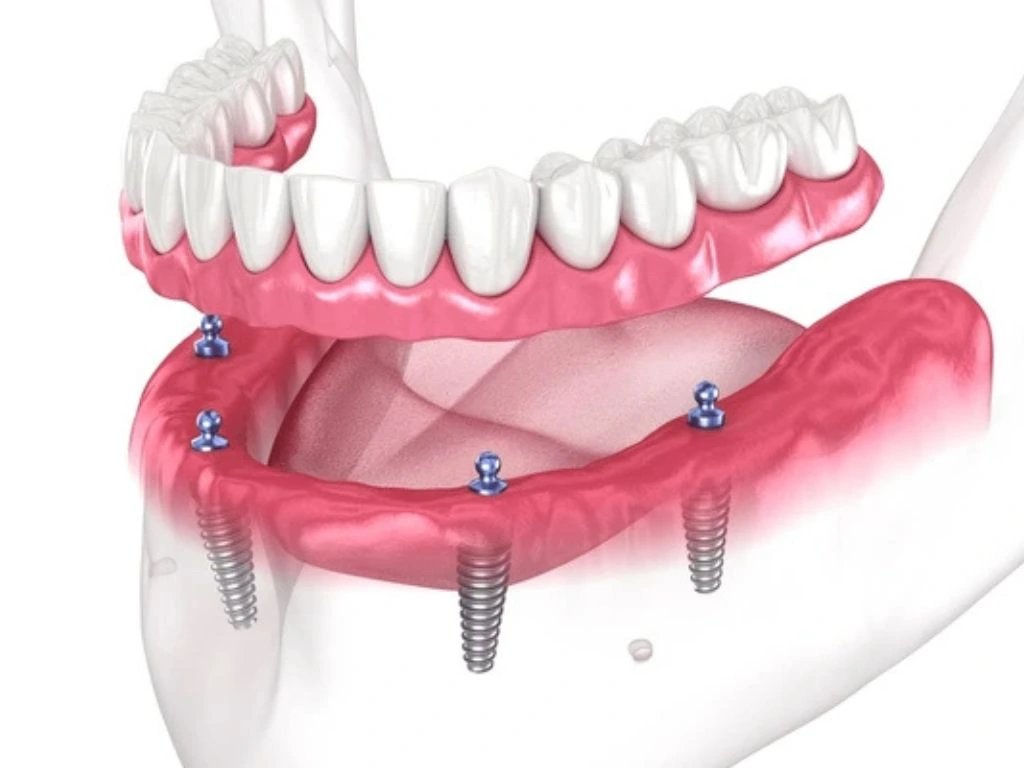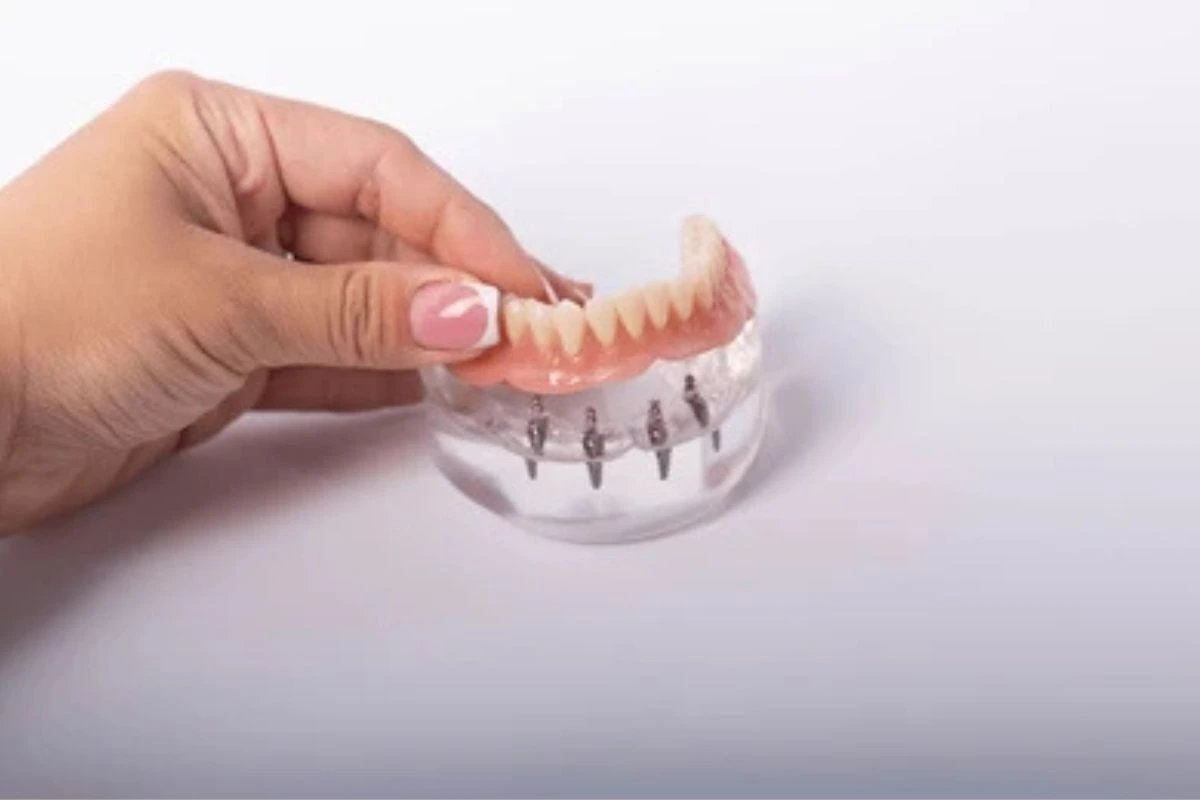Implant supported dentures is a treatment that a usually patient goes for to get a natural smile and improve their quality of life. In this guide, we will cover overall things, a complete guide for implant supported dentures, their benefits, costs, how they work and more.
What Are Implant Supported Dentures?
Implant supported dentures are dental prosthetics that supported to dental implants providing a stable and secured fit than traditional dentures. Unlike conventional dentures that rest on the gums, this utilize titanium posts surgically placed into the jawbone, serving as strong anchors. This structure helps prevent the common issues associated with regular dentures such as slippage, discomfort and bone loss.
Who Is a Good Candidate for Implant Supported Dentures?
Not all is a suitable candidate for implant-supported dentures. Here are some factors that identify eligibility:
Healthy Gums: Candidates should have a healthy gums for treatment with periodontal disease
Adequate Bone Density: Sufficient bone density in the jaw is essential for implant placement. Bone grafting may be necessary for some individuals.
Commitment to Oral Hygiene: Good oral hygiene practices are important for the achieve a successful treatment of the implants.
Overall Health: Candidates should be in good overall health and not have any medical conditions that could affect healing.
Benefits of Implant Supported Dentures
Here the several Benefits of implant supported dentures for confident smile :
Improved Stability: The secure attachment of implant reduces movement and slippage, enhancing comfort and confidence.
Enhanced Bite Force: Implant supported dentures allows for better chewing enables individuals to enjoy a wider range of foods.
Preservation of Jawbone: Implants stimulate the jawbone, prevents bone loss that occurs with missing teeth.
Natural Appearance: These dentures provide a more natural look helps to improve self esteem.
Ease of Maintenance: Implant-supported dentures can be cared for similarly to natural teeth, making oral hygiene simpler.

How Do Implant Supported Dentures Work?
Consultation: A dental professional analyze your oral health discuss your needs and goals.
Implant Placement: Titanium posts are surgically implanted into patients jawbone. This procedure usually requires local anesthesia.
Healing Period: After placement the implants need time to fuse with the bone a process called osseointegration which can take several months.
Abutment Placement: Once healed abutments are attached to the implants to hold the dentures.
Denture Fitting: Finally custom dentures fitted in the abutments to assure comfort and stability.
Step-by-Step Guide to Getting Implant Supported Dentures
Initial Consultation: Discuss your goals and undergo a comprehensive oral examination.
Imaging and Planning: X-rays and 3D imaging are used to create the treatment plans.
Implant Surgery: The dental implants are been placed into your jawbone.
Healing Phase: Takes time for the implants to integrate with the bone.
Abutment Placement: Once heated, the abutments are attached.
Final Denture Fitting: Custom dentures are made and fitted on the jawbone.
Duration of Implants
Implant supported dentures are created to be a long term solution. The implants can lasts 10 to 15 years with proper care and maintenance. Taking regular check ups and good oral hygiene are essential to ensure the longevity of the implants.
Pros and Cons of Implant Supported Dentures
Pros:
Stability: Reduce risk of slipping and discomfort.
Durability: Long lasting solution comparatively to traditional dentures
Improved Functionality: Better chewing and eating capabilities
Jawbone Preservation: Helps to maintain jaw structure and appearance.
Cons:
Surgical Procedure: Requires surgery which can involve some risks.
Cost: Generally more expensive than regular dentures.
Healing Time: Requires a sufficient healings period before final placement.
Types of Implant Supported Dentures
Bar-Retained Dentures: These use a metal bar that follows the curve of the jaw and holds the dentures securely in place.
Ball-Retained Dentures: These feature ball-shaped connectors that snap into place with corresponding sockets on the implants.
Average Cost of Implant Supported Dentures
The Average cost of implant supported dentures varies based on several factors. The number of implants required directly affects the overall price, as more implants will take higher cost. The location aslo plays a important role with prices difference by region. The dentist experience can also impact the cost as highly skilled practitioners may charge more for their expertise. On average, implant supported dentures generally ranges from $20,000 to $30,000 or more, depending on individual needs and circumstances.
Things That Can Affect the Budget of Treatment
Several factors can affect the budget for implant supported dentures treatments. Preliminary treatments such as bone grafting can add to the overall costs. the choice of materials for dentures and implants depends in price impacting the total expense. It’s also essential to check your dental insurance to see it its covers any part of the procedure. The location plays an important role as costs can differ considerably depending on the area you reside in.
After Treatment Tips to Follow
Maintain Oral Hygiene: You should brush and floss daily to keep your implants and gums
Regular Check-Ups: Schedule routine dental visits for professional cleanings and examinations.
Avoid Hard Foods: Steer clear of hard or sticky foods that could damage the dentures.
Stay Hydrated: Drink plenty of water to keep your mouth moist and aid in healing.
Long-Term Benefits of Implant Supported Dentures
Improved Confidence: Many people find that their self-esteem improves with a natural smile.
Greater Comfort: Less irritation and discomfort compared to traditional dentures.
Functional Benefits: Better ability to eat a variety of foods without fear of dentures slipping.
Can Implant Supported Dentures Improve My Smile and Bite?
Yes, implant supported dentures not only enhance the appearance of your smile but also improves functionality. With a secure fit, person can enjoy eating his favourite foods without worry leading to better quality of life,
What Are the Pros and Cons of Implant Supported Dentures?
As previously mentioned the pros include stability, durability and improved function with the cons includes the surgical nature of the procedure, cost and required healing time. It’s important to measure these factors when before getting implant supported dentures.
Implant supported dentures offers a reliable and effective solution for those who seeks to restore their smile and function. While the initial investment might be higher than traditional dentures. Understanding the process, benefits and care with implant supported dentures you can make an choice about about yor dental health.
If you are considering this treatment and finds our best implant supported dentures treatment in liverpool, sydney, and get a best consultation by our expert dentist to make a decision for a beautiful smile.
FAQs
Implant supported dentures are fake teeth attached to small metal posts (implants) placed in your jawbone. They are more stable and secure than regular dentures that sit on your gums.
Good candidates have healthy gums and enough bone in their jaw for the implants. People should also practice good oral hygiene and be in good health overall.
The benefits include better stability, improved chewing ability, protection of jawbone health, a more natural look, and easier cleaning compared to regular dentures.
The average cost usually ranges from $20,000 to $30,000 or more. The price can change based on how many implants you need, where the dentist is located, and the dentist’s experience.
After getting them, it’s important to brush and floss your teeth every day, visit the dentist regularly, avoid hard or sticky foods, and drink plenty of water to stay healthy.
